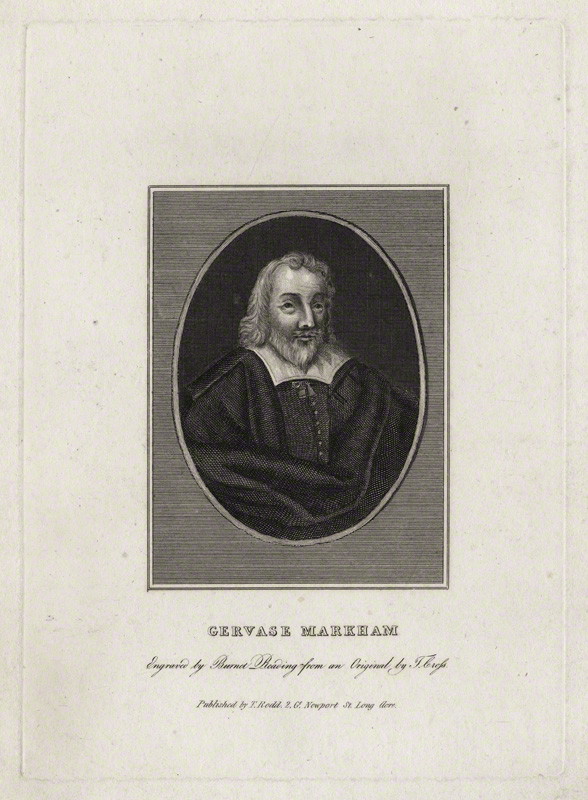Gervaise Markham (156?-1637)

Portrait of Gervase Markham
(Image in the public domain
Retrieved from https://commons.wikimedia.org/wiki/File:Gervase_Markham_by_Burnet_Reading,_after_Thomas_Cross.jpg)
Gervaise Markham (156?-1637) was an educated man in his own time. “A man so equipped at the present day, with a turn for literature, would occupy a very strong position as a scholar. In the sixteenth and seventeenth centuries it placed him in possession of all that could be known of any science or art then existing…” (Smith, 1976c, p. 224). He was a prolific author, linguist (Dunlop and Williams, 1996, p. 266), Latin scholar and translator. Markham’s foray into writing about farm animal care was Cheap and Good Husbandry, the first edition appearing in 1614. Several editions followed and continued to sell after his death in 1637. The Rosen collection contains the 13th edition published in1637. Gervase Markham was “... probably the most prolific and popular writer on veterinary and agricultural matters in between the late sixteenth and late eighteenth centuries” (Curth, 2013, p. 222). When Markham was writing, information about animal health was neither organized nor based on scientific fact. Practitioners were for the most part untrained cow leeches, horse leeches or farriers with more or less experience handling animals. Gervase Markham saw an opportunity to gather and organize existing snippets of information about farm animal diseases and repackage it as popular literature for the livestock owner. Markham was primarily a compiler of information, so little of his content was original. Markham’s lack of experience treating animals coupled with descriptions of brutal treatments of his own devising led Markham to be both a bestselling author and agricultural writer who was roundly criticized by contemporaries, as well as by subsequent veterinary practitioners and historians.
Gervase Markham “... probably the most prolific and popular writer on veterinary and agricultural matters in between the late sixteenth and late eighteenth centuries” (Curth, 2013, p. 222
It was Markham's claim of an infallible way of curing all diseases of cattle that set his critics alight. In the preface to Cheap and Good Husbandry, Markham (1664, 11th ed., p. v) addresses To The Courteous Reader, “…and hence it hapneth, that my self, having seriously bestowed many years to find out the truth of these knowledges, of which I have entreated in this Book, have now found out the infallible way of curing all diseases in Cattle; which is by many degrees more certain, more easie, less difficult, and without all manner of cost and extraordinary charges, than ever hath been published by any home –born or forrain practitioner.” This outrageous statement was a marketing ploy according to veterinary historian Smith (1976c, p. 231), “In order to cause the book to sell, there is a notice by Markham that he has found an infallible way of curing all diseases of cattle!” And, again, from Smith (1976c, p. 240), “Of the many deliberate lies of which he was guilty, there is perhaps non blacker than the announcement of his discovery of an infallible system for curing all diseases of animals…”.
“Of the many deliberate lies of which he was guilty, there is perhaps non blacker than the announcement of his discovery of an infallible system for curing all diseases of animals…”, Smith (1976c, p. 240).
An outspoken critic of Markham a century later was John Lawrence (1753-1839), a country practitioner, agricultural writer, and veterinary historian. Lawrence reserved severe criticism for Gervase Markham whose legacy endured in multiple editions of Cheap and Good Husbandry. “The redoubtable Gervase Markhan was for more than a century the oracle of sapient grooms, the fiddle of old wives, and the glory of booksellers. After having painfully laboured through his works, it remains with me a doubt whether this famous writer ever possessed any real knowledge of the horse, or the art veterinary, from his own practice and experience. He was, in my opinion, nothing better than a mere vulgar and illiterate compiler” (Lawrence, 1810, pp. 10,11).
“The redoubtable Gervase Markhan was for more than a century the oracle of sapient grooms, the fiddle of old wives, and the glory of booksellers". He was, in my opinion, nothing better than a mere vulgar and illiterate compiler” Lawrence (1810, pp. 10,11).
keywords: agricultural writer
James Clark
Edward Coleman
William Youatt
William Percivall
William Dick
John Gamgee

